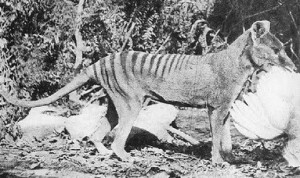If I could see any surviving animal on the planet, I’d probably pick a Tasmanian Tiger. Also known as a Thylacine (Thylacinus cynocephalus), it’s a cult favorite of animal tourists because it’s almost certainly extinct. But the almost has tantalized biologists and cryptozoologists since the last known one died in a zoo in 1936. It’s a semi-magical creature; many wildlife watchers may go see the new movie The Hunter, starring William DaFoe, just to see a make-believe surviving Tassie Tiger.
For animal tourists there’s one big question: do we get to see a recreated thylacine? Finding a live one would be thrilling; it would undo one of humankind’s great recent ecological mistakes. The filmmakers nicely sum up the thylacine’s history, including playing the film of the zoo creature pacing, which you can find on YouTube. That video is particularly haunting because it shows how recently the thylacine lived and how close we may have come to still having this creature that looks like a cat-dog-hyena-kangaroo hybrid. The answer, happily, is yes, the movie has a thylacine. And it’s a plausible one, trotting in a forgiving mist. And there’s an overall environment, rah! rah! kind of message.
But this is by no means the movie wildlife watchers would make about the fantastic hope that a living thylacine represents. The movie has the soul-crushing plot of the 2001 novel by Julia Leigh that an amorphous European drug company hires a mercenary to kill the real last remaining thylacine. The company somehow knows where to find the animal and knows it secretes some magical, marketable chemical.
DeFoe’s main character, Martin David, is kind of an opaque jerk, as you might suspect of a mercenary. Of course he has to have some redeeming qualities, but director Daniel Nettheim is pretty stingy in revealing any. Set in a remote, hardscrabble logging village, the movie has a backdrop of the kind of local loggers versus environmentalists conflict we see around the globe. Both sides are kind of horrible–the violent thuggish loggers and the hippy environmentalists. There’s some confusion over which faction is secretly allied with Big Pharma. But in general the parallel between the greedy drug company willing to wipe out a species that is beyond endangered and lumber companies eager to take out the forest is pretty clear. Along the way the drug company–or is it the lumber company?–commits a lot of senseless murders for which it will go unpunished. The trouble is that the killings seem so senseless that they border on implausible. And, wait, why does the big evil company need to destroy the thylacine for its potion? Just so no one else could get it? Are they that horribly powerful or just horribly plotted?
Published in 2001, the book is already a bit out of date in the YouTube era where a credible homemade video of a live thylacine would go viral and get the world media to descend on Tasmania.
 The movie downplays the ongoing interest in finding the thylacine as a few tourists wandering through hoping to find one in a few hours. But huge rewards have been posted over the years–including one by Ted Turner and two rewards worth a total of about $3 million offered right now. prize right now. Sites like Where Light Meets Dark obsessively track the post-extinction sightings, both Australia mainland (where it people wiped it out 2,000 years ago) and on Tasmania. The thylacine may be the first animal brought back from extinction if Australian biologists finally tease out viable genes from all the museum specimens, as they have been trying to do for over a decade. These interesting characters will have to wait for another movie.
The movie downplays the ongoing interest in finding the thylacine as a few tourists wandering through hoping to find one in a few hours. But huge rewards have been posted over the years–including one by Ted Turner and two rewards worth a total of about $3 million offered right now. prize right now. Sites like Where Light Meets Dark obsessively track the post-extinction sightings, both Australia mainland (where it people wiped it out 2,000 years ago) and on Tasmania. The thylacine may be the first animal brought back from extinction if Australian biologists finally tease out viable genes from all the museum specimens, as they have been trying to do for over a decade. These interesting characters will have to wait for another movie.
I mean, I know the movie is called The Hunter and not The Thylacine, but it is relentlessly grim.
| SEE ANIMALS IN AUSTRALIA | ||
| xazq |
Where to SEE WEIRD BIRDS (All the interesting birds: pelicans, puffins, prairie chickens, vultures, hummingbirds) |
| Where to SEE ODD ANIMALS Coait, Prairie Dog, Otter, kangaroo, skunk, porcupine, salamander, snake, squid, pretty much anything rare |


Recent Comments